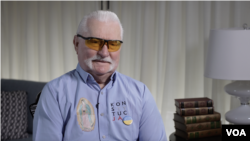Former Polish President Lech Walesa visited the U.S. capital this week to rally for renewed U.S. military aid to Ukraine. The 80-year-old labor leader-turned-politician and Nobel laureate said the United States and the world have a unique opportunity to facilitate political regime change in Russia.
Walesa, who received a Nobel Peace Prize in 1983, said the world must continue providing Ukraine with military aid, as Russia continues its attacks against Ukrainians.
"But relatively more resources need to be applied to convincing people that peace is better than war," he said.
This interview has been edited for clarity and length.
VOA: What message do you want to deliver to the American people and to Congress?
Former Polish President Lech Walesa: In this visit, the most important issue is Ukraine. Ukraine is suffering a lot, and the world has to help Ukraine.
VOA: In 1989, the Solidarity movement won over communist rule in Poland. Back then, was the fight different compared with Ukraine's fight against Russia today?
Walesa: The world was always divided, but as it grows, it makes its structures larger and larger. Only Russia and China have clung on to the old solutions. Two countries are attempting to enlarge their structures by force. But we choose to make our organizations, such as the European Union and NATO, larger by voluntary choice. The question I pose is, which of the two approaches will win now — the old one or the new one. We should use less power, less force, more ... information. We should argue peacefully by acts and words, the least by tanks.
VOA: Two years ago, the world said Ukraine would not hold up against the Russian army. Did you expect Ukraine's response to the invasion?
Walesa: Ukraine was placed in front of an imperative. Courageous nation. We've known that, just because we used to fight with them, too. But such conflicts in the past proved to us that those were bad methods. Which is why, like brothers in solidarity with Ukraine, we act.
VOA: Since the first days of the full-scale war, Poland was one of the closest Ukrainian allies. Considering some tense political statements last year, where do you see Ukrainian-Polish relations now?
Walesa: You know, it's hard not to have conflicts when you have a million guests. Given the scale of the refugee problem we are dealing with, our conflicts with them are few by comparison. Poland managed to escape into the European Union. We are aware in Poland that if we didn't succeed in fleeing into the European Union, it would be us having war with Russia now. And having that awareness, we support Ukraine more. Ukraine has replaced us in that role.
VOA: Do you think the West is doing enough for Ukraine to decisively win this war and for Russia to decisively lose?
Walesa: The Solidarity movement showed how to win. The way to win is to use information policies to win arguments rather than through war. We must continue supporting military methods, because the Russians are shooting at Ukrainians. So, that struggle has to continue.
But relatively more resources need to be applied to convince people that peace is better than war. We need to record all the casualties of war on the Russian side. And we need to send messages directly to the neighbors of the casualties and say, "Look, your neighbor died. You are going to be next. And maybe the day after tomorrow, your son will die, because your system is bad."
Even if Ukraine wins and defeats Russia this time, militarily speaking, Russia will regain strength and attack us again in 20 years. But if we help the Russians change their system, they will not attack us anymore. The world has an opportunity bigger, better than at any time in the past, because Putin managed to unite the entire world against Russia. So, we have an opportunity to achieve a great victory. But not by force. By politics.
VOA: During Russian President Mikhail Gorbachev's time, you warned the West to be careful negotiating with Russia. What would you say now to those who consider negotiating with Russia to stop the war in Ukraine and conceding territories?
Walesa: We cannot force Ukraine to such solutions. It will not solve the problem. We had the same case with [Nazi leader Adolf] Hitler. We must stop Russia. Yes, right now we must use force as a solution, because that's the fight. But long term, we must pay more attention to words and information policy. If we now force Ukraine to compromise, if we now force Ukraine to give up land, this would be a huge mistake.
This interview originated in VOA's Ukrainian Service.




